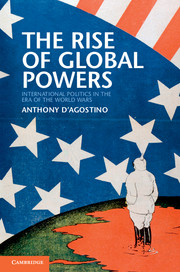Book contents
- Frontmatter
- Contents
- Maps
- Acknowledgements
- Introduction
- 1 The great powers at the dawn of world politics
- 2 Global origins of World War I: from the China scramble to the world crisis of 1904–1906
- 3 Global origins of World War I: a chain of revolutionary events across the world island
- 4 Balance and revolution, 1914–1918
- 5 A ragged peace, 1919
- 6 Scramble for Eurasia, 1919–1922
- 7 Drastic acts of unhappy powers, 1922–1923
- 8 Storms in the lull, 1924–1927
- 9 Politics and economics of the great slump, 1928–1933
- 10 A vogue for national economy
- 11 Mussolini’s moment, 1933–1935
- 12 The global civil war, 1936–1937
- 13 Last years of peace, 1937–1939
- 14 The European war, 1939–1941
- 15 The world war
- 16 Balance and hegemony
- Maps
- Notes
- Index
13 - Last years of peace, 1937–1939
Published online by Cambridge University Press: 05 June 2012
- Frontmatter
- Contents
- Maps
- Acknowledgements
- Introduction
- 1 The great powers at the dawn of world politics
- 2 Global origins of World War I: from the China scramble to the world crisis of 1904–1906
- 3 Global origins of World War I: a chain of revolutionary events across the world island
- 4 Balance and revolution, 1914–1918
- 5 A ragged peace, 1919
- 6 Scramble for Eurasia, 1919–1922
- 7 Drastic acts of unhappy powers, 1922–1923
- 8 Storms in the lull, 1924–1927
- 9 Politics and economics of the great slump, 1928–1933
- 10 A vogue for national economy
- 11 Mussolini’s moment, 1933–1935
- 12 The global civil war, 1936–1937
- 13 Last years of peace, 1937–1939
- 14 The European war, 1939–1941
- 15 The world war
- 16 Balance and hegemony
- Maps
- Notes
- Index
Summary
With the international civil war as the motif of the period 1936–8, Churchill’s “loaded pause,” the underlying question was: Which way would the British and the Americans tilt? At the end of that period the United States gave a sign of inclining toward anti-fascism. It was only a small tilt in that direction. The prevailing drift was slightly stronger and of the opposite kind, rather a Cold War paradigm, in effect accommodating the anti-Communist fascist powers in their presumed plans for a global struggle against the long arm of Moscow. There were many good reasons for the drift. The Soviet Union of this period was consumed by an ocean of terror against presumed “enemies of the people.” It was a dungeon in which every thinking person feared for his life every day. Conservative western critics could argue plausibly that it, not fascism, was the real threat in France, Spain, and China. Those who did not look at the matter ideologically also had good reasons to resist a rally to anti-fascism. The first was fear of war. Pacifists thought it ghoulish to contemplate revisiting the experience of the trenches of 1914–18. Realists wondered what would be left of Europe at the end of another general slaughter with even more refined battlefield weapons and, to boot, strategic bombing of cities.
Even those realist Europeans who recognized that the Nazis needed to be faced up to had to wonder: Who will bell the cat? Perhaps Mussolini, ever vigilant on the Brenner, according to his deepest nature, it was thought. Italy was the only power ever to make a threatening gesture to the Nazis. Certainly not Poland, which seemed to envision a role befitting its status as a great power in the new Europe that Hitler called for. Could France fight Germany alone? Should Britain permit this to happen and court the possibility of its own cities being bombed? After all, what did Hitler really want? Hadn’t he said in Mein Kampf, and didn’t he repeat constantly, that his objective was to conquer Russia? In the end, a war between the Soviet Union and Germany, ghastly as it might be, was not the worst possible nightmare that a west European could conjure. For that matter, horrible to say, it might even solve some problems. And, even if one supposed that the anti-fascists were right, where was the place to make a stand? It would certainly have been bizarre to propose declaring war on Japan because of Manchuria, or on Italy because of Ethiopia, or Germany because of the Rhineland. Should Spain have been allowed to become the Balkans of the new world war? In the nineteenth century each of these issues would have been a prompting for a conference to make the appropriate changes and offer compensation to those whose status had been insulted by them. But now it was 1914 every year. Was any single issue important enough to warrant a general war? One comfort, it was thought, was that there was still plenty of time. When the issue was important enough, it would let us all know. We would not have to argue about it.
- Type
- Chapter
- Information
- The Rise of Global PowersInternational Politics in the Era of the World Wars, pp. 347 - 390Publisher: Cambridge University PressPrint publication year: 2011



